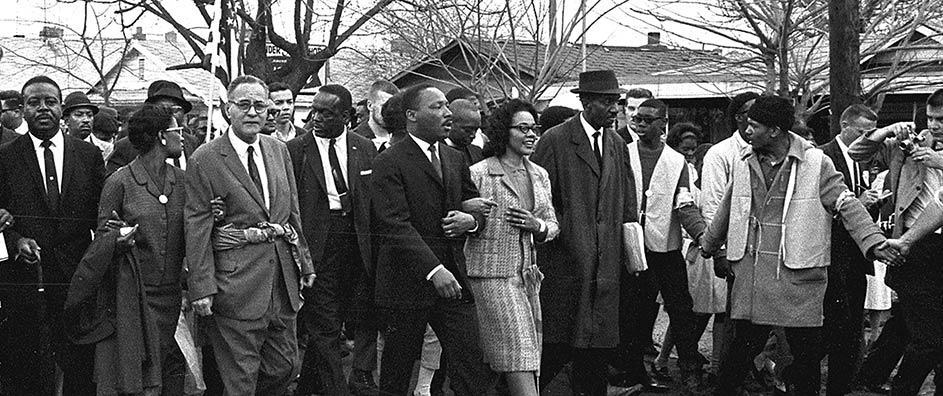The intersection of faith and social justice has a storied narrative within the Bahá’í Faith, particularly as it resonates with pivotal historical events like the Selma marches of the 1960s. The advocacy of Martin Luther King Jr. during the Civil Rights Movement exemplifies a paradigm of nonviolent protest, which is deeply entwined with Bahá’í teachings. This article will explore the unique confluence of Bahá’í principles, the Selma marches, and the actions of King, aiming to elucidate what truly engenders change in society.
At the heart of Bahá’í teachings lies the principle of oneness—of humanity, of purpose, and of God. This fundamentally transformative idea insists that unity is not merely desirable but essential for societal advancement. The Selma marches, which culminated in what is now known as Bloody Sunday, serve as a poignant case study for this concept. They illustrated that collective action, powered by a shared vision of justice and equality, can galvanize social change. King’s leadership underscored the importance of unity—both within the African American community and in forging alliances across broader societal segments.
Significantly, the Bahá’í Faith posits that true change emanates from a prayerful foundation. This perspective was captured in King’s own penchant for prayer and spiritual reflection, which undergirded his formidable activism. The connection between spiritual resolve and social activism is a theme consistently echoed in Bahá’í writings. A devoted individual endowed with fervor and the understanding that their mission is divinely ordained can inspire collective movements. Thus, the impact of prayer as both a personal and communal catalyst becomes paramount. The followers of the Bahá’í Faith are urged to engage in acts of service not as an obligation, but as a manifestation of their spiritual convictions.
The methodology employed by King and his contemporaries highlights another essential Bahá’í teaching: the effectiveness of nonviolent resistance. Violence begets violence, while nonviolence fosters understanding and compassion. The demonstrations at Selma exemplified this principle, wherein protestors stood resolute in their convictions, facing brutal opposition with dignity and grace. Correspondingly, Bahá’í principles commend the power of dialogue—between individuals of differing backgrounds—fostering an ethos of understanding rather than confrontation. This resonates with the call for transformation, where social ills are addressed not through aggression but through peaceful coexistence.
The importance of education is also central in both the historical context of Selma and Bahá’í teachings. Education acts as an emancipatory force that enlightens individuals about their rights and responsibilities. King emphasized the critical nature of knowledge in galvanizing the masses, promoting an informed citizenry capable of discerning injustice. Bahá’í teachings advocate for universal education, recognizing its role as the primary vehicle for societal evolution. In essence, the educated populace is a catalyst for change, equipped to challenge the status quo through both discourse and action.
Moreover, the nature of leadership during significant movements is another focal point of analysis. King exemplified a transformative leadership style that is congruent with Bahá’í definitions of leadership as selfless service aimed at the greater good. His ability to inspire hope and resilience amidst despair galvanized countless individuals to join the fight for civil rights. In Bahá’í thought, effective leaders are seen as those who rise not for personal accolade but in catalyzing a community toward its intrinsic aims. Good leadership cultivates environments where contributions are welcomed, and diversity is celebrated—a hallmark of both King’s approach and Bahá’í ideals.
Furthermore, the relationship between faith and activism is enriched in the context of the Selma marches. The Bahá’í Faith emphasizes that spiritual principles must manifest in tangible actions. The faithful cannot separate their beliefs from their civic duties; rather, they are compelled to act in accordance with their values. King portrayed this integration eloquently, impelling his followers to consider their spiritual responsibilities as intertwined with their social ones. In this light, activists are called not only to protest but also to embody the virtues they wish to see in society.
Another pivotal aspect is the interplay between patience and urgency in advocating for justice. The marches at Selma necessitated an urgent response to systemic racism and inequality. However, the Bahá’í teachings underscore the importance of patience as a virtue. Change does not happen overnight; it is a gradual process that requires perseverance. This dialectic between the immediacy of social demands and the long view of progress is essential in navigating the often turbulent waters of social reform. Understanding this duality equips activists with the fortitude to sustain their efforts, even when faced with setbacks.
Lastly, it is vital to assess the legacies of such movements through the lens of ongoing social justice efforts. The principles demonstrated during the Selma marches resonate profoundly within the present-day interfaith dialogues and movements toward equity. The Bahá’í teachings advocate for continuous engagement in the betterment of society—a sentiment echoed in the remembrances of Selma’s historical significance. The tapestry of social change is woven by recognizing the past, understanding the present, and envisioning a future that is just and inclusive.
In conclusion, the interplay between Bahá’í teachings, the actions of Martin Luther King Jr., and the Selma marches represents a compelling blueprint for societal transformation. It emphasizes the importance of unity, nonviolence, education, and compassionate leadership. As we reflect on these moments in history, we are reminded that change is not an isolated event but a continuous journey that requires the commitment of individuals to engage in both prayer and action towards a just world.
